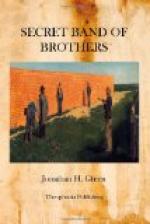Your obedient servant,
John E. Cary.
Cleveland,
August 5, 1845.
[This letter was written in reply to a letter addressed me by the Rev. O.E. Morrill, requesting my return to Auburn, fifteen days previous to his publishing my statements as false, and letter No. 7 will show in what manner I replied.]
No. 5.
Cleveland, July 12, 1845.
Mr. O.E. Morrill:
Dear sir,—I have just received yours of the 10th. Speaking in regard to Wyatt’s case, you state that you was very much surprised at my letters. Why did you not tell me so before they were published? You also heard both the first and second letter before I left your section. Why did you not object to them before?
Again, you say, some parts are my own representations. This I deny. I will not say that I have given them verbatim, but this I do say, and will maintain, that I have not exaggerated in my statements.
Yet I do not wish to injure that poor doomed man. God forbid. I do not think as you do about Wyatt. I know him better than you do, or can. I know that he has been the child of circumstances. I know that he is not a man who will strictly confine himself to the truth; and fear of death will make him do any thing that he is told to do. His denying what he told me, I care nothing for. In my statements, if they were not correct from him to me, I am not accountable; I believe them to be facts.
Now for a few questions to brighten your memory. When we entered his cell for the first time, you introduced me as a man who had lived in the south. I interrogated him on his past life. Did I not commence at Huntsville, in the year 1832, and trace him to November, 1835, at the mouth of the Ohio, with the Texas troops? When he told me that he had known me up to that date, that he also saw me at St. Louis, do you not recollect his asking me if I had not heard of a man being murdered in, or near St. Louis, one man hung, and the other acquitted? And do you not recollect I told him I thought I did; also, that at the same time I was informed, that the people thought that the guilty man was cleared, and the innocent one hung. He laughed, and said he was the guilty one, or something amounting to the same? Do you recollect, in your own letter to the Tribune, you stated that over fifty gamblers were recognised, with whose doleful history we were both familiar? Also, do you not recollect his telling about their lynching him; about the cords cutting his arms? Do you not recollect when I talked about the Tucker, or flat-boat murder, he told how they cut out the entrails, to prevent the body from rising? Do you not recollect that you and myself talked the same over at your house? You certainly cannot forget. He told me so much, I can think of but little, which I thought most essential to remember. I am willing to say nothing more about his case, until his execution; if I am satisfied it will be beneficial to the community, as well as Wyatt. But to retract one syllable, I cannot, unless I find myself mistaken, in which case I will make any acknowledgment necessary.




